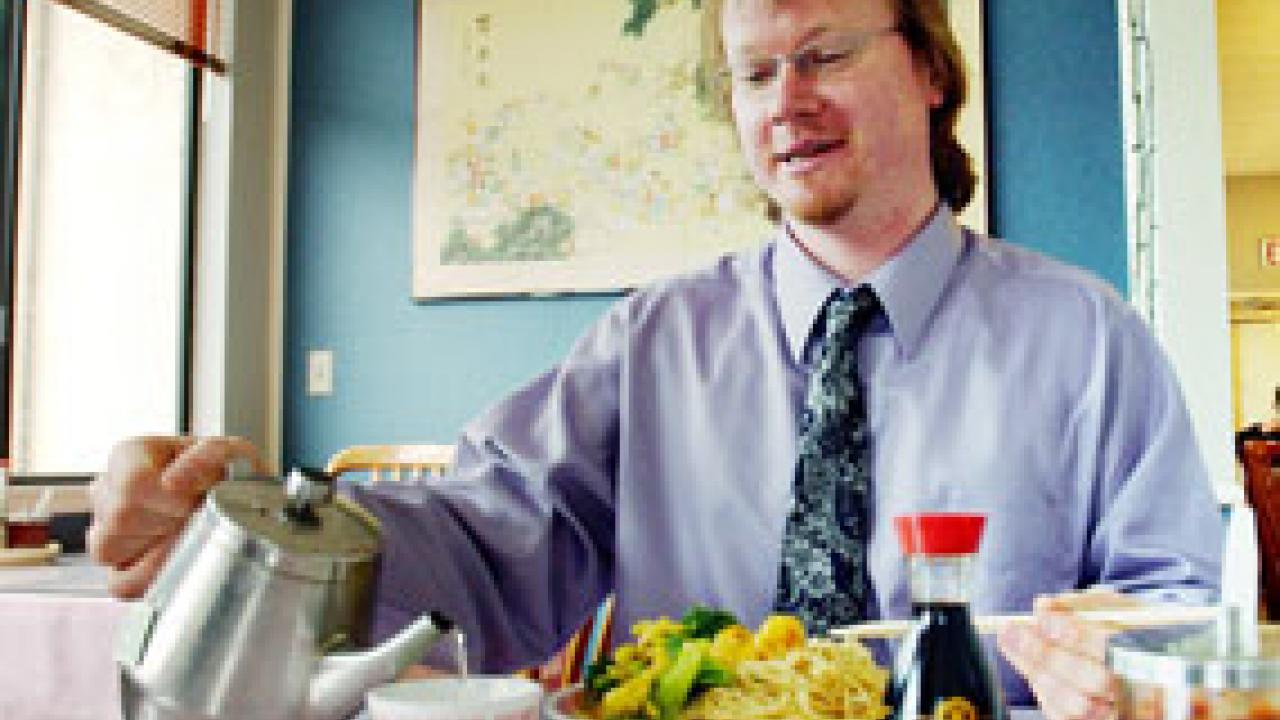The Romantic writers created their own motto: Eat, drink and make choices in life.
Sound familiar? It should, says UC Davis English professor Timothy Morton, whose scholarship links our modern food culture to the European intellectuals of 200 years ago.
Fresh from Colorado University in Boulder, where he taught and researched for eight years, Morton is a new breed of English professor. Rather than reaching far beyond the text to give context, Morton is a cultural historian who uses the text to drill down into a European society and to explain how it became the bedrock of modern Western sensibilities.
"In particular, the very politics of food and the way we look at eating came directly from the Romantic era when people in Europe became aware that they had a choice of what to eat -- and what not to eat," Morton says. "That's the beginning of the self-conscious consumer."
These are also the people who brought us sandwiches, picnics, mineral water, vegetarianism, going out to ethnic restaurants -- and, in fact, visiting restaurants at all.
Many of today's practices can be traced to cultural upheavals forced by the French Revolution, says Morton, editor of a new book, Cultures of Taste/Theories of Appetite: Eating Romanticism.
The idea of eating out at a restaurant was triggered when French cooks, fleeing for their lives in the revolution, found themselves setting up businesses -- restaurants -- in France and England. These were very different establishments from the traditional inns, Morton says. The French chefs offered menus.
About the same time, the British had their own political confrontation with "freedom fries" when fish and chips crossed the Channel with French immigrants. "From the English point of view, eating beef was being patriotic but eating fried fish was having to consume a weird taste from a foreign place," Morton says.
The Romantic poets of the 1820s and '30s became trend setters whose views prevail today in Western society, Morton says. Vegetarianism, for instance, was for the first time a wide-spread movement embraced by intellectuals such as writers Percy and Mary Shelley. "They were interested in pure things and eating healthy foods -- it was revolutionary to think you didn't have to eat what had been on your parents' plates."
Also during the Romantic period, the British quest for adventure abroad -- plus experience in foreign colonies -- brought home to England ethnic restaurants, Morton points out.
"They had a fascination with the 'Orientalism' of food -- Chinese and Indian," he says. "The whole idea was to try on somebody else's culture through their cuisine."
Morton has also researched the 18th-century fascination with drugs and alcohol. While vegetarians such as the Shelleys disdained alcohol and drugs as being unhealthy, many in England were attracted to inexpensive ways to get intoxicated.
"Tincture of opium was cheaper than beer," he points out. "And gin was new and inexpensive in the 18th century. It was seen as being seriously addicting." That alcohol and drugs could create addictions in people was a concept developed in this period, Morton says.
Defending his thesis
When Morton proposed to his Oxford dons that his doctoral thesis be on the link between Percy Shelley's poetry and his ideas about food and drink, the idea fell flat. "Nobody thought that was what literature scholars studied in the late 1980s," Morton says.
But he persisted, eventually turning an approved dissertation into his first book, Shelley and the Revolution in Taste: The Body and the Natural World, in 1994. The ground-breaking scholarship helped launch a popular field of study among English literature scholars. His new edited volume shows the growth of scholarly interest in the field.
Morton's fascination with how European food traditions intertwined with global history led to an investigation into a broader look at European history when the spice trade ruled commerce. His 2000 book, The Poetics of Spice: Romantic Consumerism and the Exotic, pulls from writers such Shakespeare (Othello was set in the spice port of Venice) and Dryden. Through these works of literature, he tells the story of how food and drink were powerful economic, political and cultural forces in history.
Morton's expertise in the culture of food brought him to UC Davis this year, where he is teaching in both the Department of English and the Nature and Culture Program.
He says he was attracted by UC Davis' reputation for cross-disciplinary work and for the campus's history in food and wine. Already he has been approached to work with faculty at the Mondavi Institute for Wine and Food Science.
But Morton was also intrigued by the Nature and Culture Program that parallels his own penchant for pushing against disciplinary boundaries. "Food makes me think of the environment -- our physical, material relationship to the outside world," Morton says.
He will be a faculty leader in an initiative by his division dean, Elizabeth Langland, to create a new master's program in the culture of food.
As much as he loves research, teaching is Morton's passion. He is proud of the teaching award he received at CU Boulder last year. "I'm not a lecturer at all; I use texts, believing less is more." He encourages his students to articulate their ideas in class and asks that they write four to five essays each quarter.
"I really care about writing and want my students to see how to put an idea into words that others will hear and listen to," he explains. "The beauty of writing is you can hesitate. That sense of gap -- the space -- allows you to appreciate the world and other people."
